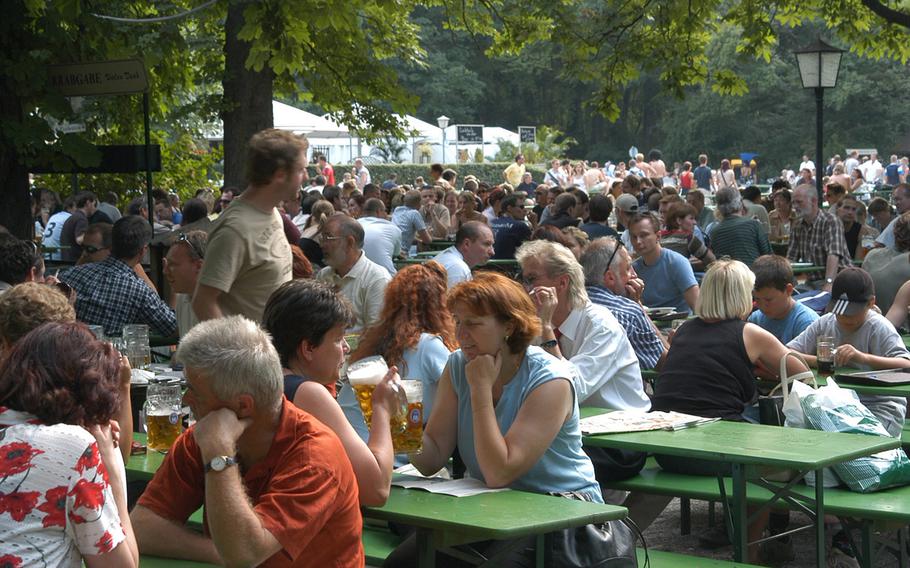
People relax in a beer garden in Munich, Germany, in this file photo taken before the coronavirus pandemic. Face masks and distancing will be required when beer gardens reopen on May 10, 2021, in parts of Bavaria with low coronavirus incidence rates. (Michael Abrams/Stars and Stripes)
Stars and Stripes is making stories on the coronavirus pandemic available free of charge. See more staff and wire stories here. Sign up for our daily coronavirus newsletter here. Please support our journalism with a subscription.
KAISERSLAUTERN, Germany — Beer gardens will be able to reopen next week in parts of Bavaria, including Grafenwoehr, where coronavirus numbers have fallen well below the level where curfews, closures and lockdowns become mandatory under federal law, state officials have said.
But although restrictions are set to be eased in time for a string of German holidays and Americans’ Memorial Day weekend, the state’s star tourist draw later this year, the Oktoberfest, remains canceled, organizers said.
“The Oktoberfest will not take place. And that is definite,” spokeswoman Gabriele Papke said.
The celebration, which attracts more than 6 million visitors from around the world to Munich to drink beer and eat sausages and sauerkraut, and generates more than $1.3 billion in revenues for Bavaria, was set to take place from Sept. 18 until Oct. 3.
Bavarian Governor Markus Soeder said Monday that officials had decided to cancel the festival for the second year in a row because of the coronavirus pandemic.
After it was called off last fall, dozens of beer halls and other establishments in Munich held smaller events, and Munich Mayor Dieter Reiter said he hoped that would happen again this year, The Associated Press reported.
That looked possible after Soeder announced Tuesday that beer gardens and the outdoor areas of restaurants in parts of Bavaria where the coronavirus incidence is below a weekly average of 100 new cases per 100,000 residents would be allowed to open their doors as of Monday.
Beginning on Thursday, fully vaccinated people and those who can produce a test to show they’ve had the virus and fully recovered will no longer be bound by curfew, quarantine and other stay-at-home restrictions, and don’t need a test before going shopping, Soeder said.
They also won’t be counted toward the total of people allowed at gatherings, he said. Under federal rules, no more than 20 people can attend public events in enclosed spaces and anyone at a gathering of more than five people either must be able to show proof of a negative test for the virus or that they are fully vaccinated.
Cinemas, theaters and opera houses can also reopen Monday, but everyone must continue to wear a face mask, keep at least three feet away from others and wash their hands frequently, say the new rules, which run until June 6.
If infection rates remain low, hotels, vacation rentals and campsites may be allowed to reopen May 21, just ahead of the long Whitsun holiday weekend, Soeder said.
But if cases in Bavarian towns and cities rise above 100 per 100,000 residents, the so-called emergency brake rule imposed by the federal government last month will be applied and restrictions will be reimposed.
The state is the first in Germany to ease its coronavirus rules, Soeder said.
“In addition to being a tourist destination, I think it is psychologically important for people to know that we are looking to the future,” he said.
Stars and Stripes reporter Marcus Kloeckner contributed to this report.
zeitvogel.karin@stripes.com Twitter: @Stripes.Zeit